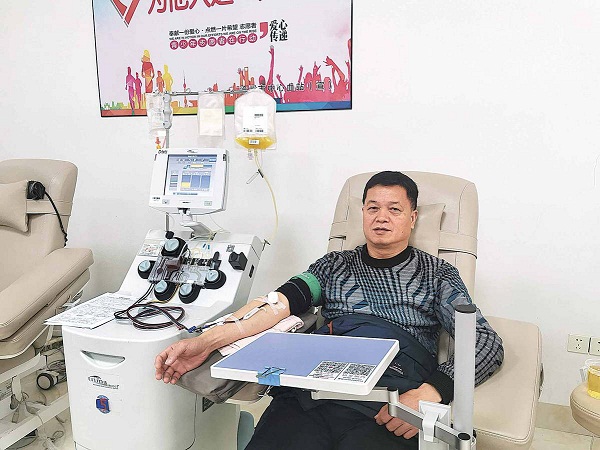Need blood? Count on math teacher to help

Wu Huiying donates blood platelets at a clinic in Zhangzhou, Fujian province. [Photo/CHINA DAILY]
Fujian high school instructor has donated 110 times since 2002
Many people donate blood once or twice, but they are unlikely to do it 100 times.
Wu Huiying has.
Over the past 19 years, the high school math teacher in Zhangzhou, Fujian province, has donated blood and blood platelets 110 times, a total 105,000 milliliters in all, or about the blood volume of 23 adults.
The 54-year-old donor said he hoped to help others as much as possible, although he and his family have not personally benefited.
"I will continue to donate if my body permits. After all, blood is reproducible," he said.
Wu said it all started by chance.
In 2002, when he and his wife took their then 6-year-old daughter Wu Fan to a park, she showed interest in a mobile blood collection vehicle near the entrance.
"She asked to see what was happening in the bus, and I had to fill out a form for blood donation to go on board," he said. After that, Wu began to donate more regularly. According to regulations in China, a healthy donor can donate blood platelets twice a week and blood every six months.
Wu has donated blood platelets 102 times. During the process, a machine extracts the platelets and returns the other components of the blood.
"The first time I saw the rotating machine, I was a little scared," he said. "But soon, I found that just liked donating blood, I felt nothing during the process, except that my mouth was dry occasionally. The nurse told me not to do any strenuous exercise after."
Blood bank staff evaluate the health of donors, who have to meet certain standards. For example, they can't be aged 60 or over and must not have ailments such as anemia or high blood pressure.
Wu, who has been awarded national medals for his voluntary efforts, last donated blood platelets at the end of July.
Influenced by her father, Wu Fan, Wu Huiying's daughter, decided at a young age to become a doctor. In 2014, she enrolled as clinical medicine major at Fujian Medical University and is now a postgraduate student.
"I knew he donated blood frequently, but the amount still surprised me," she said. Now an intern at the emergency department of Fujian Provincial Hospital, she said the demand for blood is high, but supply is severely lacking.
"Voluntary donations are a major source for hospital blood banks. It's very important in helping patients in need," she said, adding she supports her father.
Wu Huiying's experience has also inspired about 100 students and some of his colleagues to become donors. Zheng Liqin, a former student, said Wu Huiying is always kind and warmhearted.
"He told us that donating blood can save lives, and is a demonstration of humanitarianism, solidarity and mutual aid-today, you help others, and in the future, you or your families can be helped," the 29-year-old woman said.
According to regulations, blood donors and their families are given priority access to donated blood in emergency situations. Zheng said she has donated blood four times, without "feeling any discomfort".
Su Shaohua, a colleague of Wu, said he has donated blood five times since 2009, when he first learned about Wu's deeds.
"It's not common for a person to keep on donating for so many years. His perseverance and compassion are deeply moving," the 58-year-old said.
Once, the mother of one of Wu's co-workers was hospitalized and in need of blood. Wu himself could not donate because he had only just done so, but he shared the woman's plight with his friends. Soon, a friend volunteered to donate.
In another case in 2016, the daughter of a friend was diagnosed with leukemia. Armed with years of contacts, Wu helped secure proper hematopoietic stem cells for her via a QQ group.
"It's a pity that she still died after a year," he said.
Zeng Jia, deputy director of the Fujian Blood Center, said that for most hospitals, the supply of blood barely meets demand, so donations are very important and will be used by people in need.
Yang Jie in Fuzhou contributed to this story.




